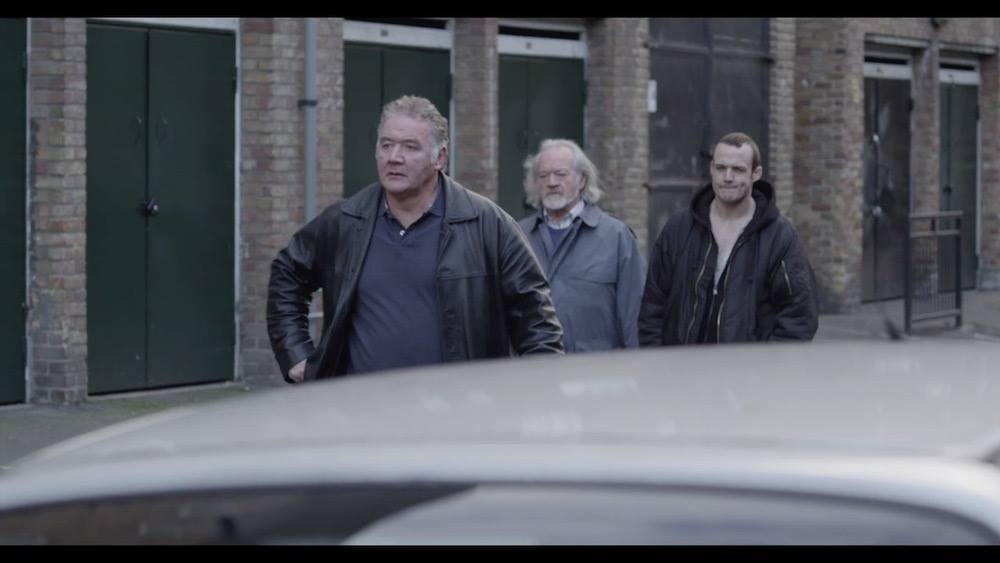It’s been a week!

First, Friday last –I hear about the success of the ‘Tá’ (Yes) in the Irish referendum to repeal the 8th amendment to their constitution that forbade abortion – no more.


And finally on Tuesday – I helped screen a preview of the excellent film ‘Sink’, viewing and discussing with friends in the local Labour Party and in the company of the film’s writer and director, Mark Gillis.
Set in London’s East End, the film portrays Micky, a working class man who attempts to keep his family – himself, his aged father and troubled son – afloat in the context of a punishing welfare & jobs regime. In the film, metaphorically and literally, the banking crisis of 2007 looms on the London skyline, but I found myself taking issue with others in our discussion after the film. It was suggested that the current ‘system’ was an inevitable response to that banking crisis. Although I would be just as judgemental about the bankers, I felt that the system is in fact a deliberate design by the Conservative government that used austerity (I like to call it arseterity) as a cure for notional overspending by the previous Labour government. It has proven to be a wicked and cruel policy that has impoverished the weak and enriched the already wealthy.
The film portrayed Micky as helpless, as he sinks within that system until in the end he decides to transcend it, introducing a moral complexity that got us talking.
So what else could be done? First we must recognise that the system is no accident and that it can be changed. My friends in Ireland who had canvassed in so many neighbourhoods, Joan Baez singing Joe Hill and my own systems thinking inspire this recognition in me!
As an enthusiastic member of the Institute for Educational Cybernetics a few years ago, I became clearer about the value of a systems thinking approach to addressing social challenges – specifically, in my case, the design of education. Cybernetics was famously applied in the context of central government (a word that is fundamental to the field) in the case of Cybersin and Allende in early seventies Chile.
But such centralised thinking must be matched by consideration of each individual’s need to think, value, and act accordingly, to make any system function well. We can suffer as victims of a system or we can choose to become effective ‘ants’ and through principled action, change it or make it serve our collective needs!
For me, this is why I chair the local Labour Party and seek to encourage members to work together, respecting their diversity and humanity.
SO…
In the wonderful world of Twitter, I serendipitously came across Lankelly Chase. I won’t address all of their work here, but I do recommend their account of their vision, mission and values, which focus on the systems which surround those who suffer severe disadvantage.
I think their model of systems behaviour, although intended to help improve matters for the likes of Micky, could also be applied more widely, but with one proviso – it should address the system and the individual.
The system behaviours Lankelly Chase identify in this regard are about perspective, power and participation and relate to ‘everyone’ and their understanding of the system – I have added my notes to these and to their assumptions.
What do you think?
| PERSPECTIVE | Lankelly Chase’s words | My notes of advice to the individual |
| 1. People view themselves as part of an interconnected whole | Everyone working towards positive change understands that their actions form part of a web of activity made up of the contribution of many others. Everyone wants the system as a whole to work, and knows they cannot control it. | Make acts transparent at every level, cross refer and give credit to others. |
| 2. People are viewed as resourceful and bringing strengths | Everyone is viewed as bringing both strengths and weaknesses as part of a resourceful network of people who are continually growing and learning from each other. | Praise the strengths; recognise and forgive the weaknesses; offer ‘unconditional positive regard’. |
| 3. People share a vision | People appreciate each other’s perspectives and seek common purpose and understanding. | Allow for diversity; tolerate alternatives. |
| POWER | ||
| 4. Power is shared, and equality of voice actively promoted | All people are able to play their fullest role in building an effective system. Unequal distribution of power, including structural inequality, is continually addressed. | Exercise positive discrimination e.g. use all-women short lists, or more fun: insist that men make and serve the tea & coffee. |
| 5. Decision-making is devolved | Those people closest to a complex situation are free to engage with its uniqueness and context and to use their initiative to respond to it. | Act freely within a framework of responsibility to values and integrity rather than unquestioning loyalty to leaders. |
| 6. Accountability is mutual | System improvements are driven by accountability to the people being served. The people being served are supported to take responsibility for their own change. | Offer meaningful redress when something goes wrong. |
| PARTICIPATION | ||
| 7. Open, trusting relationships enable effective dialogue | People feel safe to ask the difficult questions, voice disagreement and deal with the conflict and uncomfortable emotions that surface. | Ideally, be a friend who listens and cares! |
| 8. Leadership is collaborative and promoted at every level | Leadership is identified and valued as much in the person experiencing interlocking disadvantages and the frontline worker, as in the CEO or commissioner. | Lead by offering a service to frontline workers, rather than accepting a privilege. |
| 9. Feedback and collective learning drive adaptation | People can see a learning loop between the actions they take and their understanding of the problem they are trying to solve, so that each is being continually adapted and refined. | Seek to reflect in and on action. This is cybernetics and is an aspect of my PhD! |
| Assumptions | ||
| Systems are complex and often messy webs that are constantly shifting. They consist of tangible things like people and organisations, connected by intangible things like history, worldviews, context and culture. | Recognise that systems are multi-layered, and performance at one level cannot be simply explained by characteristics at another. | |
| Everyone who is part of a system holds a different perspective on its nature, purpose and boundaries. No one person holds the whole truth (including us). | Make these perspectives clear, through listening and dialogue. | |
| Everything and everyone exists in relationships, and these involve emotions. | Recognise emotions, impulses from bodily reactions and also feelings, constructs formed in the mind, sometimes through faulty or incomplete logic and evidence. | |
| Change emerges from the way the whole system behaves not from the actions of any one project or organisation. We therefore need to help build the fitness of the system to generate positive change. | Embrace those we dislike or find uncomfortable. | |
| The complexity of systems means we can’t fully plan how to achieve the changes we seek, but we can identify several conditions that enable positive change and the actions that are likely to move us toward our goal. | Gather evidence, review and plan again for an iterative, action inquiry approach. | |
